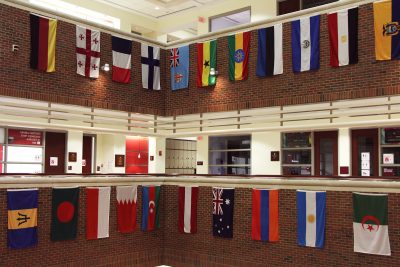The Boston City Council declared April Arab American Heritage Month during its April 7 meeting. Councilor At-Large Annissa Essaibi George offered the resolution, which passed unanimously, to celebrate Arab American contributions to the country and the city.

“Waves of Arab immigrants to Boston entirely reshaped our city, especially in the South End,” Essaibi George said during the meeting. “I am so proud to be an Arab American, and I think the first Arab American city councilor. I know my father and family in Tunisia are proud too.”
April’s national designation as Arab American Heritage Month was first recognized by the State Department this year, while some states — including Arkansas and Virginia — have officially declared it a month-long celebration.
The national bill is sponsored by Rep. Rashida Tlaib, D-Mich., an Arab American herself and the first Muslim woman to serve in Michigan State Legislature.
Nearly 80,000 Arab Americans live in Massachusetts and 7,500 in Boston, according to the City Council’s resolution. Nearly 3.7 million Arab Americans live in the United States, according to the Arab American Institute.
Randa Shedid, president of the Boston-based Center for Arabic Culture, immigrated from Egypt in 1990. The CAC, whose mission statement is “building bridges, connecting cultures,” is a center of education and community for the Boston area’s Arabic community, Shedid said.
She previously worked with the American Civil Liberties Union as an attorney and began the local center in 2007 after a year of collaborating with her husband and group members.
“It’s wonderful to finally feel that we’re recognized,” she said, “as much as I would hope that every single person from every different ethnic background and religious background would be celebrated and acknowledged.”
Arab Americans have faced, and continue to face, prejudice in the United States, including discrumination and violence following 9/11 and former President Donald Trump’s Muslim ban that was signed in January 2017. The City Council’s resolution acknowledged this trend — adding it “must be addressed through public education, awareness, and policies that are culturally competent.”
Shedid said although she did not know exactly why the City’s declaration came now, it seemed to reflect a broader trend following the inauguration of President Joe Biden and a wider cultural movement aiming to welcome communities alienated under the previous administration back into U.S. society.
“There’s a move to want to make everyone that was made to feel alien or insecure or not part of the society in the last four years to sort of reaffirm that this population … have been part of the urban fabric and now they are everywhere,” she said.
The resolution noted Boston Arab Americans who contributed “significant and lasting contributions” to Boston as a whole — listing a few by name, including Boston University professor Farouk El-Baz, who was involved with NASA’s Apollo 11 mission, and writer and poet Gibran Khalil Gibran, who grew up in the South End after immigrating from present-day Lebanon.
The resolution also acknowledged Boston’s Lebanese-Syrian Ladies’ Aid Society and the American Arabic Benevolent Association.
“There is now a strive for trying to make everyone in the country feel comfortable in that sense I mean whether it’s the Black Lives Matter movement, whether it’s the Muslims after the Muslim ban,” she said. “There is this push towards reaffirming that we are all part of that melting pot and that we can work together.”






















































































































